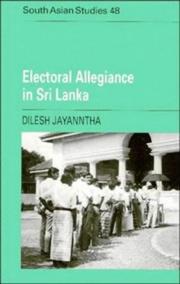| Listing 1 - 1 of 1 |
Sort by
|

ISBN: 0511521588 0521345863 0521051533 Year: 1990 Volume: 48 Publisher: Cambridge : Cambridge University Press,
Abstract | Keywords | Export | Availability | Bookmark
 Loading...
Loading...Choose an application
- Reference Manager
- EndNote
- RefWorks (Direct export to RefWorks)
Sri Lanka is one of the few new Commonwealth countries to have had a strong democratic tradition and a vibrant electoral life since Independence. In this book, Dilesh Jayanntha examines the basis for Sri Lankan electoral allegiance since 1947. He challenges the prevalent notion that caste is the basis for electoral allegiance and convincingly argues that the patron-client relationship is its primary determinant. Following an introduction outlining recent Sri Lankan political history, Dilesh Jayanntha then examines electoral allegiance in three contrasting constituencies which have a different history up until 1947. Yet, as the author demonstrates throughout, patronage networks determined electoral allegiance, and often, the patronage network was congruent with caste. Yet, as Jayanntha shows, where the patron-client tie cut across the caste tie it was the former which proved decisive in deciding electoral allegiance. This comparative analysis of electorates in Sri Lanka addresses issues that are relevant not only to South Asia but to the developing world in general.
Elections --- Caste --- Manners and customs --- Political aspects --- Sri Lanka --- Politics and government. --- Social Sciences --- Political Science
| Listing 1 - 1 of 1 |
Sort by
|

 Search
Search Feedback
Feedback About UniCat
About UniCat  Help
Help News
News